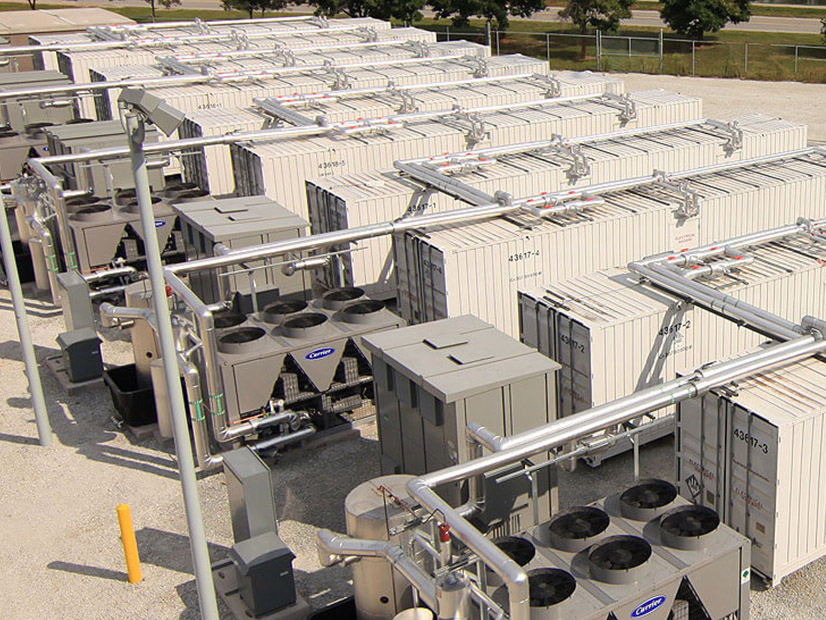Several state legislatures in the Northeast focused on energy storage during their recently concluded legislative sessions. Connecticut became the eighth state to codify storage mandates and programs, joining Massachusetts and New York.
The New England Clean Energy Council’s annual legislative roundup on Wednesday also touched on the potential for legislation to enable the Transportation and Climate Initiative Program (TCI-P) to come up during special sessions in Connecticut and Rhode Island this fall.
Connecticut
Legislation signed by Gov. Ned Lamont in June set a statewide deployment goal of 1 GW of energy storage by 2030, with interim targets of 300 MW by 2024 and 650 MW by 2027. In addition, Connecticut regulators last month finalized rules for a statewide incentive program to support the deployment of 580 MW of installed electric storage capacity by 2030.
The average upfront residential incentives will start about $250/kWh, with a maximum incentive of $7,500 per project. Commercial and industrial ratepayers will also be eligible for upfront incentives, including up to 50% of the project cost. Residential, commercial and industrial eligibility for performance incentive payments will be based on the average power a storage project contributes to the grid during critical periods. More incentives will be available for low-income ratepayers and underserved communities, in addition to small businesses and those who historically experience frequent and prolonged storm-related outages.
TCI-P legislation, which advanced out of committee this spring but never made it to the floor of the General Assembly for a vote, could be on the agenda during a fall special session, according to Mike Martone of Focus Government Affairs. He said that the special session would look to appropriate about $300 million in federal funding that could be used to implement TCI-P, which was pushed hard by environmental advocates, plus Lamont and many members of the legislature and his administration. In addition, the decoupling of the Public Utilities Regulatory Authority from the Department of Energy and Environmental Protection, which passed on the consent calendar of the Senate but never came up for a vote, could also be part of a special session, Martone added.
Massachusetts
Massachusetts Gov. Charlie Baker signed a wide-ranging climate bill into law in March after months of back and forth between him and the legislature, including a veto. The final version of the bill had more than 40 amendments from the governor.
The law requires Massachusetts to meet an interim emission-reduction target by 2025, along with new interim goals every five years to hit net-zero emissions by 2050, and to set emissions limits for specific industries, including natural gas. The law also directs the Department of Public Utilities to consider climate change as a factor in its deliberations; writes environmental justice into state law; and raises offshore wind authorization to 5,600 MW.
Massachusetts, which passed an energy storage law in 2018 that targets 1 GW by December 2025, could be looking at increased capacity for large-scale storage procurement in the future, NECEC Government Relations Executive Dan Bosley said.
Maine
A bill to ask Maine voters via referendum to create a consumer-owned nonprofit to replace the state’s investor-owned utilities, Central Maine Power and Versant Power, did not come up for a full vote in what was a quiet session.
Next year, Democratic Gov. Janet Mills is up for re-election, and previous Republican Gov. Paul LePage announced that he would seek a return to the office.
“Gov. LePage is known as an opponent to clean energy adoption goals,” said Marty Grohman, E2Tech executive director. “There’s a view that there’s a window here for clean energy policy.”
Rhode Island
One of the first bills Gov. Daniel McKee signed after Gina Raimondo resigned to become U.S. secretary of commerce was the 2021 Act on Climate, which set the framework for future decisions on climate and energy-related issues, NECEC Policy Associate Sean Burke said. It requires mandated emissions reductions, including net-zero emissions by 2050. It also requires environmental justice considerations in planning or for future climate decisions.
TCI-P, which Raimondo was a signatory to, could come back around this fall. A bill passed the Senate, and Burke is “hopeful” it will pass the House of Representatives.
Vermont
There is a lot of “forward thinking and planning” in Vermont, Bosley said, including the passage of a bill that clarifies the application guidelines for energy storage facilities. Anything more than 1 MW must go through a complete application process for a certificate of public good.
In addition, the Public Utility Commission must update interconnection rules by March 2022 to incorporate energy storage facilities larger than 1 MW and simplify procedures for facilities between 100 kW and 1 MW.



